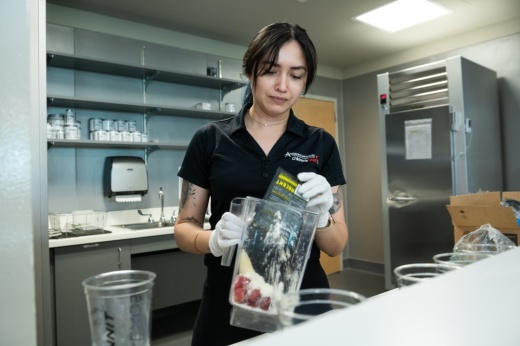Gabbie Ricky, a performance nutrition specialist at Children’s Health Andrews Institute in Plano, offered some advice about how parents can set healthy goals and encourage their kids to follow through in 2024. In her role at Children’s Health, Ricky provides nutrition counseling services to different sports athletes of all ages.
Answers have been edited for clarity, style and length.
What are some examples of a healthy resolution?
Eat more home-cooked meals and be more active. Make resolutions that involve what you can add to your routine versus what you're limiting or restricting. A lot of people try to make healthy resolutions the other way. They're like, "I'm going to limit this, restrict that." But even that little reframe, that mindset shift of "OK, I'm going to do more of this, more of that" is really helpful. Think about what you can do more of that will contribute to your health, such as eating more home-cooked meals, being more active, and then get specific. Start broad, and then come up with some specifics underneath that.
How can parents support their kids in eating healthier?
A few different ways. I think it's really important to piggyback off that first question. Get specific in what changes you actually want to implement in the household and as a family, but also make sure that the kids are involved in setting the goals and coming up with clear guidelines of what these goals are and what the resolution is. Another thing is, parents should really try to model healthy eating habits themselves. Kids are extremely observant. Be intentional and try your best because they're watching you. They're always watching and listening. It’s not just your eating habits, your eating behaviors and choosing healthier foods, but also the words that you use to talk about the food that you eat or even the words you use to talk about the food you're trying to eat less of. Avoid talking about food being good or bad for you. Eliminate those little descriptive words. Instead of talking about food being more nutritious or a little bit less nutritious, kids will pick up on that. Support them in understanding that aspect of healthy eating as well.
What are some pitfalls to pursuing healthier habits and how can families avoid them?
People try to change too much at once. That's one of the major pitfalls of New Year's resolutions as well, in my professional opinion. When we try to change too much at once, it tends to cause anxiety and overwhelm. Things feel overwhelming, it’s too much change, then we just revert back to our old ways. I see that a lot in clients and our youth athletes at Children's Health. Set very specific, measurable, realistic goals that contribute to the overall resolution you're trying to achieve. And then there’s also the all-or-nothing mentality, right? Instead of saying, "Oh, we're going to stop eating out as a family in the new year; we're just going to stop completely," avoid that mentality. Instead of all or nothing, it's all or something. I feel like those are probably the top two when it comes to healthy resolutions. People try to change too much at once, or it's all or nothing. They feel like if they fail once, then they failed so it's fine to revert back to the old ways.
How can parents encourage their kids to be physically active?
Talk to them, see if there are sports that they like and enjoy. If they're not sure, be open to them trying out new things. Talk to them about trying new things. It's as simple as their friend enrolled in this sport, so they're going to try it with them. Encourage them to try new things that they enjoy. Also encourage time outdoors and support that as a family. Maybe every Saturday morning you guys set a goal of going to the park.
How can parents talk to their kids about nutrition?
Encourage a variety of foods and talk about how the different colors of foods provide different nutrients. That can become a fun way for kids to branch out. Adding more color variety will also mean adding nutrient variety. Help kids understand that. They learn a little bit of science and biology as they get older, but it can be as simple as saying, "Oh, what makes this vegetable green?" and "What makes this fruit orange?" Those are going to give us different health benefits, so let's try to get this many colors in, every day. Make it a little bit more applicable to their age level so they understand yes, it's important, but it doesn't have to be boring. It can be fun. I think that's probably a big thing, is making nutrition fun. Involve them in decisions about what the family is eating, what is being served at the table, what is being kept in the pantry and the fridge. Take them grocery shopping with you. Involve them in washing fruits or vegetables. Just get their hands in the food.





